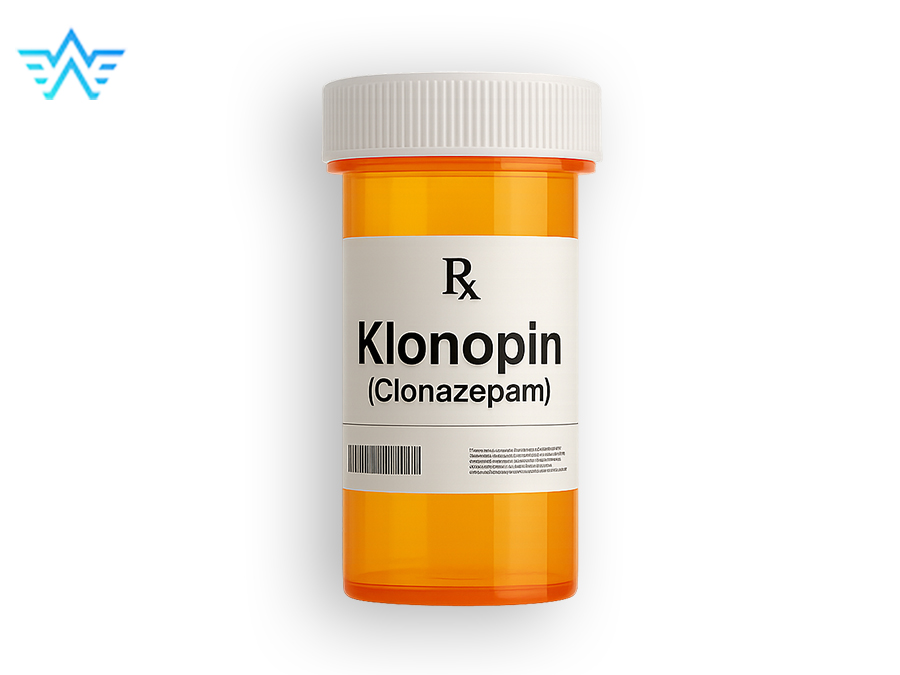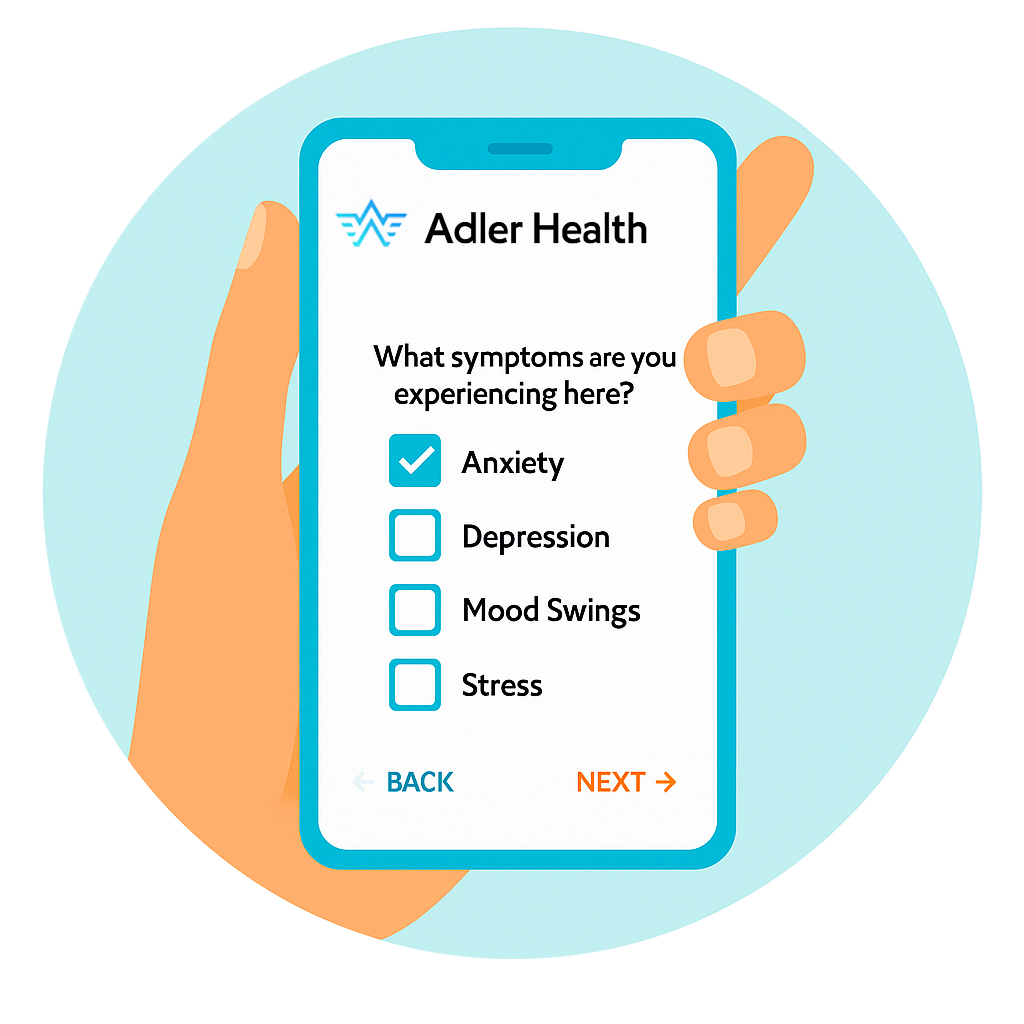Buy Clonazepam Online | Confidential Qualified Consultation
Clonazepam (Klonopin) is a prescription medication that works by calming excessive electrical activity in the brain through its action on gamma-aminobutyric acid (GABA), a key inhibitory neurotransmitter. Clonazepam is commonly used to treat seizure disorders and panic disorder, and may also be prescribed for anxiety, sleep disturbances. Clonazepam requires a prescription from a qualified mental health specialist. Adler Health ensures you're in good hands with experienced professionals. After a free virtual consultation, they’ll determine if Clonazepam is right for you.

Starting at $2.50/ pill
Indications for Use
Clonazepam (Klonopin) is a medication that is often prescribed to treat various anxiety, epilepsy, and panic disorders. Doctors note its effectiveness in reducing anxiety and improving the quality of life of patients. The instructions for use emphasize the importance of observing the dosage, as the medication can cause addiction with prolonged use.
Anxiolytic effect (i.e., reduction of manifestations of fear and anxiety) is realized due to the influence on the amygdala complex, which is located directly in the limbic system. It is expressed in a decrease in anxiety and relief of emotional tension.
Clonazepam (Klonopin) is able to suppress pathological epileptic activity in the brain, due to which this medication is used in the treatment of epilepsy and epileptic syndromes. It can be used both in monotherapy and as an adjuvant medication.
Clonazepam (Klonopin) can be prescribed to a patient with the following problems:
- Lennox-Gastaut syndrome
- absences, in case of ineffectiveness of valproic acid or succinimides
- akenitic and myoclonic seizures
- focal epileptic seizures
- tonic-clonic seizures
It should be taken into account that if this medication is prescribed to patients who have several types of epileptic seizures, an increase in their frequency may be observed. In these cases, patients are preferably prescribed several antiepileptic medications at the same time, or the dose of Clonazepam (Klonopin) is increased.
The effect of the medication on certain nuclei of the thalamus (non-specific) and areas of the brainstem causes a pronounced sedative effect, relieving anxiety and disorders such as panic attacks.
How It Works

Quick Health Check
Provide your medical history and describe your symptoms in a short online questionnaire. This helps us understand your situation thoroughly. It only takes 5–10 minutes.

Expert Review by Licensed Providers
Our board-certified mental health providers review your answers and build a treatment plan just for you. You’ll get updates in your patient dashboard.

Prescriptions Shipped to You
Should treatment be necessary, your medication is shipped promptly right to your door in plain, discreet packaging for your privacy.
Therapy, Treatment Services, Prescriptions at Adler Health
Mechanism of Action
Clonazepam (Klonopin) works by amplifying the effects of gamma-aminobutyric acid (GABA), the brain’s primary inhibitory neurotransmitter. Through its action on the central nervous system, it produces calming effects such as seizure suppression, muscle relaxation, and anxiety relief.
Its pharmacological activity centers on binding to specific benzodiazepine sites located on GABA receptors. This binding increases the efficiency of GABA when it attaches to these receptors, facilitating a greater influx of chloride ions into neurons. This influx results in hyperpolarization of the neuronal membrane, thereby dampening synaptic activity and overall neural excitability.
Unlike some other anticonvulsants, Clonazepam (Klonopin) does not alter the concentration of GABA in the brain or affect the enzyme GABA transaminase, which breaks GABA down. However, it does influence the activity of glutamate decarboxylase, an enzyme involved in GABA synthesis, setting it apart from other antiepileptic medications studied in comparison.
The medication's primary mechanism involves enhancing GABAergic neurotransmission without directly substituting GABA. It increases the frequency with which chloride channels open in response to GABA binding, strengthening the inhibitory effect and leading to a general depressant effect on the central nervous system.
Additionally, Clonazepam (Klonopin) has been shown to reduce serotonin (5-HT) usage at the neuronal level and exhibits a strong affinity for central benzodiazepine receptors. Due to its effectiveness in very small doses, it is categorized as a high-potency benzodiazepine.
The anticonvulsant action of Clonazepam (Klonopin) stems from its ability to enhance inhibitory GABA responses and to block sustained high-frequency neuronal discharges.
Interactions
Be sure to inform your healthcare provider about all medications you are currently using, including over-the-counter medications and supplements.
The sedative effect of Clonazepam (Klonopin) can be significantly amplified when combined with substances such as opioid analgesics, anesthetic agents, psychotropic medications, antidepressants, certain antihistamines, and centrally acting antihypertensives.
Medications that are metabolized by the liver and used alongside benzodiazepines may either increase or decrease Clonazepam (Klonopin)'s effects. For example, medications like disulfiram, cimetidine, erythromycin, ketoconazole, and ritonavir may intensify its action. Conversely, agents such as rifampicin, phenobarbital, phenytoin, primidone, and carbamazepine may reduce its effectiveness.
Alcohol intensifies the sedative and CNS-depressant effects of Clonazepam (Klonopin). This combination can result in enhanced drowsiness, impaired motor coordination, loss of consciousness, or even paradoxical reactions like agitation or aggression. Alcohol use should be strictly avoided during treatment.
When taken with skeletal muscle relaxants, Clonazepam (Klonopin) may extend and heighten their effects, potentially leading to increased sedation and motor impairment.
Concurrent use with amiodarone (a class III antiarrhythmic) may raise the risk of benzodiazepine-related toxicity, particularly coordination disturbances.
When Clonazepam (Klonopin) is used in combination with other anticonvulsants—especially hydantoins or phenobarbital—the likelihood of central nervous system depression and related side effects may rise.
Co-administration with sodium valproate has been associated with cases of status epilepticus.
Tobacco use can diminish Clonazepam (Klonopin)'s therapeutic effect by accelerating its metabolism.
Contraindications
Clonazepam (Klonopin) differs from other medications used during dystonia in that dependence on it develops very quickly and requires slow and gradual withdrawal of the medication. This period is especially difficult for people who are contraindicated to take the medication. That is why before starting to use Clonazepam (Klonopin), you should evaluate the contraindications to its use:
- respiratory failure (more often develops with obstructive pulmonary disease in the chronic stage);
- depression of respiratory functions;
- hypersensitivity to the main active substance of the medication; acute alcohol poisoning, in which some vital functions are weakened;
- the period after poisoning with sleeping pills or medications, narcotics and analgesics, in an acute form of the course;
- myasthenia;
- glaucoma;
- involution of the optic nerve;
- shock state;
- the patient is in a coma.
In addition to those listed above, there are additional contraindications that do not allow the use of the medication for the treatment of VSD:
- pregnancy and lactation;
- depressive states (there is a high probability of an increase in suicidal tendencies);
- impaired motor functions of the spinal column;
- cerebellar ataxia;
- chronic alcoholism;
- hyperkinesis;
- dependence on narcotic medications or chemicals;
- use of psychotropic medications;
- chronic deficiency of protein compounds in the blood;
- renal and liver failure;
- organic brain disorders;
- heart failure;
- sleep apnea;
- psychosis;
- swallowing reflex disorders in infants;
- bronchospasm syndrome;
- the period after and before surgery;
- old age of a person.
- Adverse effects
Withdrawal Symptoms
The medication can cause addiction during long-term treatment. Physiological dependence appears after reducing the dosage or completely stopping the intake. The withdrawal syndrome of Klonopin is determined by the following symptoms:
- irritability, anxiety, insomnia;
- tremor of the lower and upper extremities;
- behavioral and brain dysfunction;
- delirium tremens;
- headache;
- return of a panic attack before the fact of withdrawal;
- signs of psychomotor disorders;
- development of phobias;
- depression complicated by suicidal thoughts.
When trying to replace the medication with alcohol or other psychotropic medications, the symptoms intensify. The syndrome can last for a month or more, depending on the type of nervous system and the course of administration.
Side Effects
The likelihood and intensity of adverse effects vary based on individual patient sensitivity and the dosage taken. Stopping Clonazepam (Klonopin) due to severe reactions is uncommon.
- Cardiovascular effects: possible symptoms include irregular heart rhythms, such as bradycardia or tachycardia, and chest discomfort.
- Hematologic and lymphatic effects: these may include reduced white blood cell count (leukopenia), decreased neutrophils (neutropenia), agranulocytosis (manifesting as chills, fever, sore throat, and significant fatigue), anemia, or low platelet count (thrombocytopenia).
- Neurological effects: especially at the beginning of therapy, and more frequently in elderly patients, symptoms can include sleepiness, tiredness, dizziness, reduced focus, motor incoordination, sluggishness, emotional dullness, and slowed reactions. Less common issues may include headaches, mood elevation, depressive symptoms, tremors, memory problems, antegrade amnesia (higher risk with large doses), inappropriate behavior, mental confusion, dystonia, muscle weakness, speech difficulties, and myasthenia. Prolonged use in certain epilepsy cases may lead to more frequent seizures.
- Visual disturbances: blurred vision, double vision, or involuntary eye movements (nystagmus) may occur.
- Respiratory issues: breathing suppression is possible, especially with IV administration. Infants and small children may develop excess bronchial secretions.
- Digestive system effects: may include increased saliva in young children, dry mouth, unpleasant taste, indigestion, nausea, vomiting, appetite changes, constipation, or diarrhea.
- Urinary and renal effects: these might include difficulty urinating, unintentional urination, urinary discomfort, or impaired kidney function.
- Musculoskeletal issues: muscle-related symptoms such as weakness, tremors, or muscle pain can occur.
- Vascular system: a minor drop in blood pressure may be observed.
- General reactions and injection site effects: patients may feel weak overall or experience fainting.
- Immune system: rarely, serious allergic reactions like anaphylaxis have been reported.
- Dermatological effects: may include rashes, itching, hives, hair loss, or changes in skin pigmentation.
- Liver and biliary effects: there might be slight elevations in liver enzyme levels, liver dysfunction, or jaundice.
- Reproductive and hormonal effects: some individuals may notice irregular menstruation or changes in sexual desire (increase or decrease).
- Effects on pregnancy and newborns: use during the first trimester can be harmful to the fetus (teratogenic). Newborns whose mothers took Clonazepam (Klonopin) may show signs of central nervous system depression, respiratory difficulties, or a weakened sucking reflex.
- Psychiatric reactions: in rare cases, patients may develop unexpected behavioral changes like aggression, hallucinations, agitation, irritability, insomnia, restlessness, tremors, or seizures. These paradoxical effects are more likely to occur in individuals who consume alcohol, elderly patients, or those with existing psychiatric conditions.
- Dependence and withdrawal: even at therapeutic doses, physical and psychological dependence can develop, particularly with prolonged or high-dose use. Individuals with a history of substance abuse are at greater risk. Abrupt discontinuation can lead to withdrawal symptoms.
- Hidden depression: in some cases, pre-existing but undiagnosed depression may surface during treatment.
Patients may experience side effects not listed here. Any unusual symptoms should be promptly reported to a healthcare provider.
Let Adler Health Serve You!
If you or a loved one is struggling with a mental health disorder or a co-occurring disorder, Adler Health is here for you. Contact us today to learn more about our mental health treatment programs and other resources.




